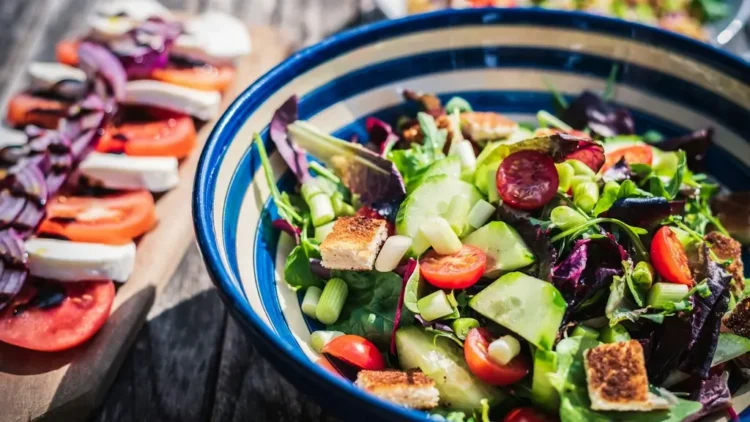Physical Address
304 North Cardinal St.
Dorchester Center, MA 02124
Physical Address
304 North Cardinal St.
Dorchester Center, MA 02124

The Mediterranean diet is widely recognized as one of the healthiest eating patterns in the world. Inspired by the traditional foods and flavors of countries bordering the Mediterranean Sea, this lifestyle focuses on whole, nutrient-dense ingredients and balanced eating habits. If you’re looking to boost your health, improve energy levels, and enjoy flavorful meals, the Mediterranean diet is an excellent place to start.
Below you’ll find a complete guide to what to include, what to limit, and a simple weekly menu to help you begin your Mediterranean journey.
The foundation of the Mediterranean diet is built on fresh, unprocessed, and naturally nutrient-rich foods. Here are the key components:
Fill your plate with colorful vegetables such as tomatoes, cucumbers, leafy greens, zucchini, kale, bell peppers, and broccoli. Aim for vegetables at most meals to maximize vitamins, minerals, and antioxidants.
Choose seasonal fruits—berries, oranges, grapes, apples, and bananas are excellent choices. Dried fruits like figs or dates can also be enjoyed in moderation.
Whole grains supply steady energy and essential fiber. Include foods like oats, bulgur, quinoa, farro, barley, and brown rice. Avoid refined grains and choose whole-grain versions whenever possible.
Olive oil is the star of the Mediterranean diet and should be your primary fat source. Avocados, nuts (almonds, walnuts), and seeds (chia, flax) provide additional heart-healthy fats.
Aim to eat fish two to three times a week. Fatty fish such as salmon, sardines, anchovies, and mackerel are rich in omega-3 fatty acids that support cardiovascular health.
Beans, chickpeas, lentils, and peas are excellent sources of plant-based protein and fiber. Incorporate them into soups, salads, and stews regularly.
Consume moderate amounts of yogurt and cheese, ideally from sheep or goat milk. These provide protein, calcium, and probiotics.
Enhance meals naturally with herbs and spices like basil, thyme, oregano, rosemary, garlic, turmeric, and cumin. This reduces the need for excess salt.
While the Mediterranean diet is flexible and enjoyable, there are certain foods worth minimizing to maintain its health benefits:
Packaged snacks, fast food, frozen meals, and highly processed items often contain unhealthy fats and added sugars.
Reduce sugary drinks, pastries, candies, sweetened cereals, and other high-sugar foods.
Choose whole-grain versions instead of refined bread, pasta, and rice.
Eat red meat sparingly. If you include it, choose lean cuts and limit intake to occasional meals.
Avoid products made with partially hydrogenated oils, including some margarines, packaged pastries, and processed snacks.
Limit cured meats, bacon, sausages, and heavily salted foods. Focus on real flavor from herbs and spices instead.
Here’s a nutrition-packed weekly menu to help you get started:
Breakfast: Greek yogurt with mixed berries and almonds
Lunch: Lentil salad with chopped vegetables and olive oil
Dinner: Grilled salmon served with quinoa and steamed spinach
Breakfast: Oatmeal with banana slices and walnuts
Lunch: Whole-grain pita with hummus, cucumber, and bell peppers
Dinner: Chickpea and vegetable stew with whole-grain bread
Breakfast: Fresh fruit bowl and a soft-boiled egg
Lunch: Tuna salad with leafy greens and olives
Dinner: Grilled chicken with roasted Brussels sprouts and sweet potatoes
Breakfast: Spinach, apple, and avocado smoothie
Lunch: Farro salad with tomatoes, arugula, and feta
Dinner: Baked sea bass with garlic, lemon, and fresh herbs
Breakfast: Whole-grain toast topped with avocado and tomato
Lunch: Quinoa tabbouleh with parsley and mint
Dinner: Margherita pizza on a whole-wheat or cauliflower crust
Breakfast: Whole-grain toast with ricotta cheese and fresh figs
Lunch: Classic Greek salad with tomatoes, cucumbers, olives, and feta
Dinner: Shrimp pasta tossed in olive oil, garlic, and herbs
Breakfast: Berry smoothie bowl topped with granola
Lunch: Minestrone soup with kale and cannellini beans
Dinner: Grilled lamb chops with roasted eggplant and couscous
The Mediterranean diet is more than an eating plan—it’s a culture centered around fresh ingredients, mindful eating, and balanced meals. By focusing on whole foods, healthy fats, and vibrant flavors, you can improve your overall well-being while enjoying delicious dishes every day. Whether your goal is better heart health, sustainable weight management, or simply healthier eating habits, the Mediterranean lifestyle offers a flavorful and rewarding path.